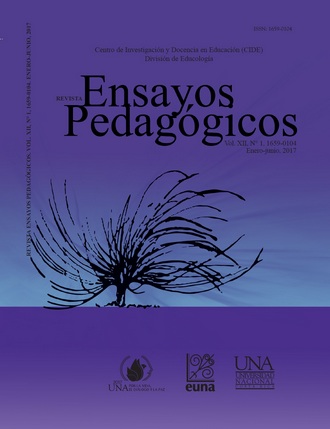Inverted Classroom (IC) or Flipped Learning (FL) as a Pedagogical Mediation Method Applied in an Integrated English Course for Other Specialties at Universidad Nacional (UNA), Costa Rica
DOI:
https://doi.org/10.15359/rep.12-1.5Keywords:
Flipped Teaching (FT), English Teaching approaches, teaching practices, case study, pedagogical mediationAbstract
This paper summarizes the results of a case study directed to describe what actually happens with the implementation of the Flipped Teaching Approach in a group of intermediate students of English at the English for Other Majors Program at Universidad Nacional, Costa Rica. The study provides some insights into those activities used as pedagogical mediation tools within the English classroom, the teacher’s role and the students’ academic performance in a 120-hour program which lasts 17 weeks. This investigation considers students’ interest and motivation towards the learning of a foreign language and the incorporation of new technologies and the usage of social media tools. The information was collected through the use of a diagnostic exam, classroom observations, and interviews to the students, with the implementation of several of the principles on which this teaching methodology is based. This article describes the methodology followed, problems encountered, and achievements during this period. The information and results obtained will be analyzed and then, some general conclusions regarding pertinence and impact will be drawn.
References
Bergmann, J. y Sams, A. (2012). Flip your Classroom: Reach Every Student in Every Class Every Day (en línea). Internacional Society for Technology in Education. Library of Congress. Recuperado de https://books.google.co.cr/books?hl=es&lr=&id=-YOZCgAAQBAJ&oi=fnd&pg=PR7&dq=Flip+your+Classroom:+Reach+Every+Student+in+%09Every++Class+Every+Day&ots=AEi9HMpsmg&sig=F-M2Zuzym8unnBiabpPZ1XucuVI&redir_esc=y#v=onepage&q=Flip%20your%20Classroom%3A%20Reach%20Every%20Student%20in%20%09Every%20%20Class%20Every%20Day&f=false
Bolaños, I. y Núñez, M. (2011). Informe final del plan de fortalecimiento del Inglés. Coordinación Interinstitucional PFI, Cursos de Servicio. Universidad Nacional (UNA).
Boles, C. et al. (2014). The Flipped Classroom: An introduction to technology and teaching techniques (en línea). First Digital Printing. ISBN 978-1-63102-004-9. Recuperado de http://www.amazon.com/The-Flipped-Classroom-Introduction-Technology-ebook/dp/B00K9N5X00
Bretzman, J. et al. (2013). Flipping 2.0-Practical Strategies for Flipping your class. Wisconsin: The Bretzmann Group. Recuperado de http://www.amazon.com/The-Flipped-Classroom-Introduction-Technology-ebook/dp/B00K9N5X00
EDUCAUSE. (2015). Learning Initiative. Things you should know about Flipped Classroom. Recuperado de http://net.educause.edu/ir/library/pdf/ELI7081.pdf. 1/30/2015
Hernández, R., Fernández, C y Baptista, P. (2014). Metodología de la Investigación (6ta ed.). México, DF: McGraw Hill.
Murillo, J. et al. (2002) Estudio de casos [en linea]. Recuperado de https://www.uam.es/personal_pdi/stmaria/jmurillo/InvestigacionEE/Presentaciones/Curso_10/EstCasos_Trabajo.pdf
Núñez, M. (2015). Informe anual. Coordinación Interinstitucional PFI, Cursos de Servicio. Universidad Nacional (UNA).
Rodríguez, E. (2013). Informe parcial. Plan de fortalecimiento del inglés. Coordinación Interinstitucional PFI, Cursos de Servicio. Universidad Nacional (UNA).
Santiago, R. (2015). The Flipped Classroom [video]. Recuperado de http://www.theflippedclassroom.es/
Tourón. J. (2013). La enseñanza inversa y el desarrollo del talento. A propósito de manifiesto [en linea]. Recuperado de http://www.javiertouron.es/2013/09/la-ensenanza-inversa-y-el-desarrollo.html
Universidad Nacional. Escuela de Literatura y Ciencias del Lenguaje. (2008). Plan del fortalecimiento del Inglés de la Escuela de Literatura y Ciencias del Lenguaje en La Universidad Nacional e Costa Rica.
Downloads
Published
How to Cite
Issue
Section
License
Copyright (c) 2017 Revista Ensayos Pedagógicos

This work is licensed under a Creative Commons Attribution-NonCommercial-NoDerivatives 4.0 International License.
Ensayos Pedagógicos is subscribed to the Attribution-NonCommertial-NoDerivatives 4.0 International Creative Commons Licence, which allows both authors and readers to freely download, store, copy, and distribute the final approved publisehd version of the manuscript (post-print) as long as this is done without commercial purposes, no derivative works are generated, and the source and author are mentioned. As well, Ensayos Pedagógicos declares that authors will remain the rightful owners of the copyrights of their work in perpetuity.







